Understand Your Rights. Solve Your Legal Problems

Timothy M. Lupinacci a shareholder in Baker Donelson, one of the US’ top 100 law firms. He is chair of the firm’s Financial Services Department, a member of the firm’s Board of Directors and former office managing shareholder for Birmingham, Alabama. In his daily life Timothy lives and breathes leadership. Below Lawyer Monthly is privileged to benefit from Timothy’s extensive library of experiences as he lists the top 13 leadership books that influenced his journey and enflamed his passion as a leader.
I believe two fundamental principles about leadership. First, every person is a leader in some capacity, whether in business, family, athletic team, civic organization, church, synagogue, mosque, or book club. I think far too many people fail to see their unique leadership role played out every day and miss opportunities to influence and help others. My second foundational belief is that everyone must continue growing as a leader. It is critical for each person to be a consummate, life-long learner. Although difficult to devote regular time to leadership growth and learning, it is a discipline that is crucial for long-term success and achievement. Whether it involves attending live or simulcast seminars, systematically reading books or periodicals, leading training sessions for others or listening to podcasts and audio books while driving to work each day, you have to implement a leadership development plan become obsessive about and sticking to it in order to maximize your influence and potential.
Over the years, I have tried various approaches to leadership growth. One year I realized I had fallen out of the habit of reading and committed to read at least one book a month. This discipline continues and I try to vary the books I read. I always ensure that I read at least one leadership, teamwork, management or biography every month to consistently learn, grow and improve by considering additional principles, tips, tools and leadership approaches to adapt into my own leadership journey. I have tried to make sure and attend at least one leadership conference each year. I also have become disciplined about using time I am in the car listening to podcasts or audio books. You have to determine what works best for you, but the important thing is to develop a plan for systematic leadership growth. The great thing is that some of the best "business books" are not traditionally found in the business section at your favorite bookstore. You can gain leadership insight from a diverse array of sources. Below are a few of my favorites.
Over the years, there have been certain books that I return to in honing my leadership abilities. Often I use these books to train others. These are the resources that have provided real leadership gold to me over the arc of my career. I hope you will find some of these suggestions, which are in no particular order, useful in your own journey.
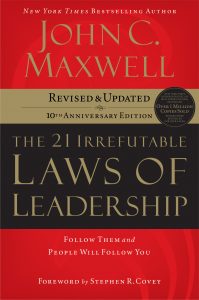
1. ‘The 21 Irrefutable Laws of Leadership’ by John Maxwell.
Maxwell has been one of my go-to resources for all things leadership and was one of the first remote leadership trainers I turned to early in my career. I debated among several of his books to include as the one to include in my personal "Baker's Dozen", including "The Five Levels of Leadership" (which is a close second), "Leadership Gold" and "The 17 Indisputable Laws of Teamwork". In the end I landed on "The 21 Irrefutable Laws of Leadership" as the one book I would include in the list. Over the years, I have read this book multiple times, lead teams through weekly discussions of each chapter in the book and taught these principles to non-profit groups. I continue to find this content fresh and relevant in my personal leadership growth and in helping others to see the value of leadership development.
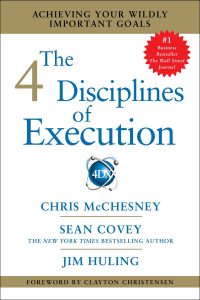
2. ‘The 4 Disciplines of Execution: Achieving Your Wildly Important Goals’ by Chris McChesney, Sean Covey and Jim Huling.
Five years after first reading this book, I think this resource has had the most profound impact in my leadership development. A lot of leadership resources focus on developing plans and goals for yourself, your teams, and your organization. The critical step, however, is actually executing on the plans when the whirlwind of daily activities consume you. The "4DX" plan outlined in this book is incredibly practical and helpful in focusing on how to best execute on a team's or individual's top strategic imperatives. I continue implementing concepts from this book daily and it pays increasing dividends in staying focused on driving results through a disciplined system of identifying your wildly important priorities, figuring out lead measures to reach those goals, building a cadence of accountability and keeping a compelling scorecard to manage progress.
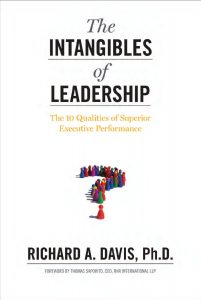 3. ‘The Intangibles of Leadership: The 10 Qualities of Superior Executive Performance’ by Richard A. Davis.
3. ‘The Intangibles of Leadership: The 10 Qualities of Superior Executive Performance’ by Richard A. Davis.
This is an succinct analysis of various intangible attributes of leadership that distinguish top performers, including fortitude, integrity, self-insight, presence and self-efficacy. The author, a management psychologist, argues that it is the intangible aspects of leadership that makes the difference between a competent leader and an extraordinary executive. Davis spent more than 10 years assessing senior leaders across various industries and found these ten behaviors fundamental to leadership success. The good news outlined in this book is that we can learn and improve upon these characteristics to grow in our leadership abilities. If you are looking for distinguishing factors in your leadership journey to move to the next level of leadership, Davis' book is an excellent resource to help you grow and stand-out among the crowd.
4. ‘Three Box Solution’ by Vijay Govindarajan.
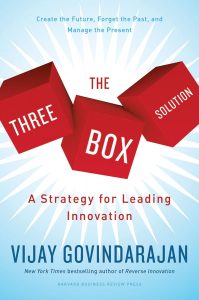
There is no dispute that business is changing more rapidly than at any prior time in our history. Informed leaders have to stay ahead of the innovation curve to successfully navigate their teams or organizations through the rapid disruption characterizing industry today. Govindarajan is a professor at Dartmouth’s Tusk School of Business who has taken various theories and practices around innovation and compressed it to a “three boxes to innovate” concept. He notes in this book that for "more than a decade, innovation has been practically synonymous with the latest cool gadget. In the new era, innovation will not be about cool. It will be about profound change…and will convey breakthrough solutions . . . [in] facing the realities of a crowded and constrained [marketplace].” I found Govindarajan's approach beneficial to ensure I was spending the necessary time implementing his structure of (i) managing the present, (ii) selectively forgetting the past, and (iii) creating the future. This book serves as a hands-on manual to implement processes and procedures to ensure you are continually evolving and staying ahead in business.
5. ‘Great by Choice’ by Jim Collins.
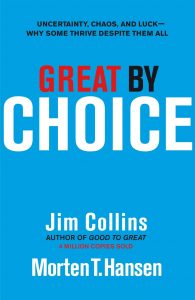
Jim Collins is one of the most important leadership writers of our time. You can pick up any of his books and find important principles to implement in your leadership journey immediately, including "Built to Last", "How the Mighty Fall" and "Good to Great." The reason I selected "Great by Choice" as my top recommendation is that Collins takes his research from earlier books and outlines specific action items that leaders can take to build truly great teams, companies and enterprises in unpredictable and rapidly-changing times. Collins states that “greatness is not primarily a matter of circumstances; greatness is first and foremost a matter of conscious choice and discipline.” I continue implementing regularly the concepts and research he describes in this book such as "10ers", "20 Mile March", "SMaC Recipes" and "Level 5 Leadership." As leaders, we must each make the choice to grow and improve to help those we lead achieve greatness. This book will definitely help you progress towards become a Level 5 leader.
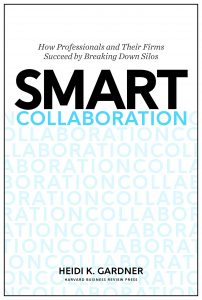
6. ‘Smart Collaboration’ by Heidi Gardner.
Gardner, a Harvard professor, has done more to influence my thinking on leadership among teams of people over the last decade than any other author or speaker. She has studied and written for years on collaboration in professional service firms. In this book, she notes that collaboration "is a means toward achieving the penultimate goal of solving complex, interesting problems-and the ultimate goal of giving firms a strategic, sustainable and profitable platform." She notes that effective collaboration enables teams and companies to be more successful in the "war" for clients and for talent. As you would expect, there are often high obstacles to getting disparate professionals to collaborate. Gardner works to provide practical approaches to overcome these barriers. This has become a critical handbook to me in understanding and shaping strategy for groups based on the vital importance of collaboration and overcoming the engrained obstacles to collaboration.
7. ‘Drive: The Surprising Truths About What Motivates Us’ by Daniel Pink.
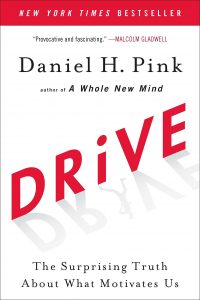
I read this book at the time I began leading our office. Pink changed my thinking on the old "carrots and sticks" approach to motivating a team towards a goal (or desired behavior). Using decades of research, Pink outlines re-defines the proven elements of true motivation in the business world. He describes that in today's environment, the secret to high performance and satisfaction is (i) autonomy—the desire to direct our own lives; (ii) mastery—the urge to get better and better at something that matters; and (iii) purpose—the yearning to do what we do in the service of something larger than ourselves. He succinctly makes the case that we have to make sure that we get individual's compensation correct, but it is these additional elements that will drive truly exceptional performance. Pink states that "the best use of money as a motivator is to pay people enough to take the issue of money off the table; pay people enough so they're are not thinking about money and they're thinking about the work." When you remove the compensation issue, Pink says that there are three factors that lead to better performance and increased personal satisfaction--autonomy, mastery, and purpose. I have seen how understanding and implementing these principles helps pay significant dividends to a group or organization.
8. ‘All For One: 10 Strategies for Building Trusted Client Partnerships’ by Andrew Sobel.
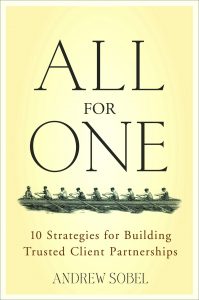
Several years ago, I heard an former executive from one of the major international accounting firms talk about client service and trusted client relationships. It was eye-opening to hear the signature efforts that accounting firms were taking to serve their clients and it convinced me that, on the whole, accounting firms were years ahead of law firms in implementing plans to become trusted advisors to clients. This insight lead me to Sobel's book on building trusted client relationships where he outlines ten strategies for transforming client relationships--five individual strategies and five institutional strategies. Focusing on professional service companies, with a strong emphasis of research and insight from accounting firms, Sobol stresses the importance of collaboration and mobilization of the right people, ideas and resources from wherever they may reside (the "all" in the title) to create a singular focus on each client relationship (the "one"). This book provides invaluable resources and ideas on developing relationship capital, institutionalizing client relationships, targeting the right clients and creating unique client experiences.
9. ‘Delivering Happiness’ by Tony Hsieh.

Although Zappos has lost some of its luster over the past couple of years, I still think Hsieh's book is the single best resource to get your juices flowing on building an award winning culture. The first part of the book focuses on the interesting rise of Zappos as a business, however, the real meat of the content I return to is in the second half describing the unique culture at the company. This content helped fuel various initiatives implemented in groups I have been involved in to build and maintain a great work-place culture. One great idea Hsieh implemented was a Zappos Culture Book built around the unique culture at his company. This included direct feedback from employees and customers. I took this idea and created my own office culture book celebrating our successful culture. Hsieh states that "if we get the culture right, most of the other stuff--like delivering great customer service, or building a long-term enduring brand and business--will happen naturally." I believe this and also believe that a business or team does not sacrifice revenue or profit while investing in an award winning culture. Another resource with some instructive ideas on building a healthy corporate culture is "Onward" by former Starbucks CEO Howard Schultz (although Starbucks is another company experiencing troublesome issues lately).
10. ‘Tipping Point’ by Malcom Gladwell.
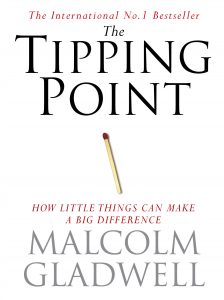
While this may not seem like a typical "leadership book", I highly recommend everything Gladwell does. The way that Gladwell deconstructs an issue to its core and then pulls profound truths always inspires my creative thinking in the business setting. He often provides very practical advice through his analysis, such as the discussion in his book "Outliers" that it takes at least 10,000 hours of practice or work in any given area to become a true expert (which is sound advice for young lawyers building their practice). In "Tipping Point", Gladwell describes "connectors", "mavens" and "salesmen" that I found useful in application to the legal setting. He also describes the "stickiness factor", which has helped guide my thinking on creating memorable business development activities for clients and potential clients. Gladwell's book "Blink" provides great insight into how intuitive judgment to make important decisions is developed by experience, training and knowledge. This has proven valuable to me in more effectively working in a profession that demands rapid-fire decisions. In addition to his writings, Gladwell's "Revisionist History" podcast likewise consistently inspires my leadership thinking.

11. ‘The Advantage: Why Organizational Health Trumps Everything Else’ by Patrick Lencioni.
Like Gladwell and Collins, I try to read everything that Lencioni publishes. You cannot go wrong reading "The Five Dysfunctions of a Team", "Death by Meeting" or "The Three Signs of a Miserable Job", all of which are excellent resources to strengthen your leadership skills. The reason I list "The Advantage" as the one to start with is that the book provides an actionable roadmap to building an operationally healthy team or organization. Lencioni makes the point that organizational health is all about building a cohesive leadership team, establishing clarity among leaders, communicating clearly to everyone within the organization and putting in place enough structure to reinforce this communication going forward. Not only are these critical in leading your group, but this resource provides an excellent actionable playbook.
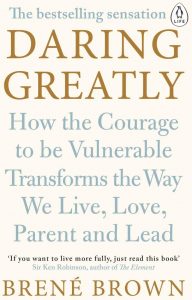
12. ‘Daring Greatly: How the Courage to Be Vulnerable Transforms the Way We Live, Love, Parent and Lead’ by Brene' Brown.
This is another resource that may not fall squarely within a "leadership book", but I think the truths discussed in this book are critical for every leader to process. Brown starts with the famous Teddy Roosevelt "In the Arena" speech from 1910, and his encouragement to dare greatly by actually getting in the arena and striving valiantly. Brown then builds on the idea that if we spend our lives "waiting until we're perfect or bulletproof before we walk into the arena, we ultimately sacrifice opportunities. She includes many practical resources in this book, including an "Engaged Feedback Checklist", "The Daring Greatly Leadership Manifesto" and even a "Wholehearted Parenting Manifesto" that are very useful. I have benefited as a leader by becoming more vulnerable and having the courage to take more informed risks based on Brown's work.
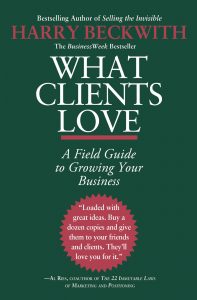
13. ‘What Clients Love’ by Harry Beckwith.
This is an interesting little book that I happened to pick up fifteen years ago when I began more fully appreciating the importance of business development. I had gotten my feet on the ground in figuring out how to be a lawyer and started realizing the need to focus with intentionality on developing business. This is a book of short, often pithy, chapters that includes great ideas and excellent examples furthering the premise that everything we do is selling ourselves. Even if we do not have a product to sell, as a professional, our skills, expertise and counsel are the "product." We need to explore how to market and brand ourselves better every day, including focusing on adding value through intangible and "non-billable" efforts and building a referral network through word of mouth. I have developed many creative ideas in business development after reading again this simple book of stories and ideas.
I remain convinced that we must continuing learning and growing from a variety of diverse resources. No matter the background or content of the resource, I try to take the topic discussed and apply it to make me a better leader, team member or encourager. These thirteen books have proved increasingly valuable over the years, and are resources that I continue to reference, use and give to others seeking leadership growth. I hope you can find a least one nugget of information from these books to help you better lead and serve those within your sphere of influence. I hope you will drop me a note and let me know additional insight you gain from any of these resources and let me know additional valuable leadership books you have read or studied.


